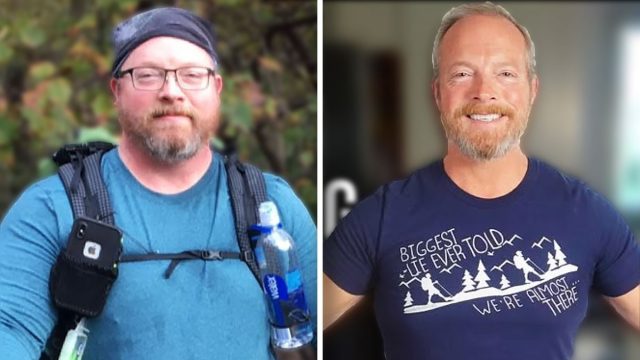Hiker Lost 100 Pounds by Walking Daily 6 Miles and Cutting Carbs Below 100g

We all want to improve our health, but making lasting changes can seem overwhelming. Dan, the creator behind the YouTube channel Backpacking Adventures, transformed his body by combining daily walks with smart nutrition choices. His journey from 271 pounds to 167 pounds proves that consistent habits beat quick fixes every time. Follow his practical approach to create your own success story.
Walking Was My Foundation
Before focusing on weight loss, Dan simply wanted to strengthen his legs for hiking. "Mainly, I was walking just to strengthen my legs for hiking because this is a backpacking channel," Dan explains in his post. He committed to walking about six miles daily around his neighborhood, often wearing a 30-pound weighted vest to simulate carrying a backpack. This consistent activity became the cornerstone of his transformation, helping him build endurance while burning calories.
Low-Carb Made All The Difference
Changing his eating approach became a game-changer in Dan's journey. "In February of 2022, I started a low-carb diet. Low-carb defined as about 100 grams of carbohydrates and below," Dan shares. He occasionally cycles into keto (under 20 grams of carbs daily) for additional benefits. This approach helped shift his body toward burning fat for energy rather than relying on constant carbohydrate intake.
The Process Takes Time
Don't expect overnight results. "This process took me over two and a half years of trial and error to try to get things that actually worked for me," Dan admits. His weight loss wasn't constant or linear—the chart showed periods of both loss and gain throughout his journey. Patience and persistence matter more than quick progress, especially for sustainable, long-term changes to your body.
Your Protein Intake Matters Most
When it comes to nutrition, prioritizing protein makes weight loss easier. "I keep my protein around one gram per pound of body weight or even a little higher," Dan explains. This approach supported muscle retention during his calorie deficit while triggering hormones that help prevent sugar cravings. Alongside moderate fat intake and low carbs, this macronutrient balance provided energy while supporting his weight loss goals.
Calorie Deficit Is Non-Negotiable
Despite all the diet variations, one principle remains constant. "If there's one takeaway you get from this, the one thing I've learned is that you have to burn off more than you're consuming in order to lose weight," Dan emphasizes. "It really does, in its simplistic terms, come down to calories in, calories out." Everything else just helps you maintain this fundamental deficit more consistently and comfortably.
Give Your Body Strategic Breaks
Constantly restricting calories leads to burnout. "Probably every four to six weeks, I'll take about three or four days, and I bump up my calories to maintenance level," Dan shares. These planned breaks helped him stay consistent long-term by giving both his body and mind recovery periods. During his intense hiking months (May through October), he even maintained or increased calories to support his high activity levels.
Intermittent Fasting Enhances Results
Time-restricted eating helped Dan optimize his metabolism. "What's comfortable for me is I like to fast for around 18 to 20 hours. So that means I only have an eating window between 4 to 6 hours a day," he explains. With just 1-2 daily meals, he naturally consumed fewer calories while gaining the metabolic benefits of extended fasting periods. This approach complemented his low-carb diet perfectly.
Track Every Bite You Take
Data provides accountability that feelings can't match. "I weigh, measure, and count everything I eat," Dan states firmly. Without tracking, you can't truly know if you're in a calorie deficit. He warns that even small things like condiments add up—a tablespoon of ketchup contains 25 calories, and most people use several tablespoons without counting them. These overlooked calories can quickly erase your planned deficit.
Make Exercise Fit Your Life
Finding activities you enjoy ensures long-term consistency. "I love to do it, but I also love working out," Dan explains about his exercise choices. Rather than forcing himself to do workouts he hated, he built a routine around walking (for hiking conditioning), VR boxing (for cardio), and weight training he could do at home. This eliminated excuses and made his fitness program sustainable over years, not just weeks.
Wake Up Earlier To Make Time
No time for exercise? Wake up before everyone else. "I do about 90 to 95% of my entire working out in the early hours before even anyone in my family is even awake," Dan reveals. His day typically starts at 3 AM, with lifting by 4 AM, followed by boxing and his six-mile walk. By finishing workouts early, his fitness routine doesn't compete with family or work commitments, eliminating the "no time" excuse.
Discipline Beats Motivation
When motivation fades, discipline carries you through. "My thought process is that motivation gives you the reason to start," Dan explains. "But discipline is the most important because I lack motivation a lot." Getting out of bed at 3 AM or passing on extra dessert doesn't happen because you feel motivated—it happens because you've built the discipline to do what's necessary regardless of your feelings.
Adapt As Your Body Changes
Be prepared for challenges along the way. "Since I lost all this weight, I am more sensitive to temperature changes," Dan notes. He also deals with some loose skin around his midsection—common with significant weight loss, especially at age 50. Fatigue during calorie deficits can be another hurdle. Acknowledging these realities helps maintain realistic expectations rather than becoming discouraged by unexpected changes.Ready to start your own transformation? Begin with daily walks and mindful carb reduction—the foundation that helped Dan lose 100 pounds and transform his life. And if you enjoyed this article, take advantage of these 15 Quick Ways to Lose Body Fat Percentage in a Week.




